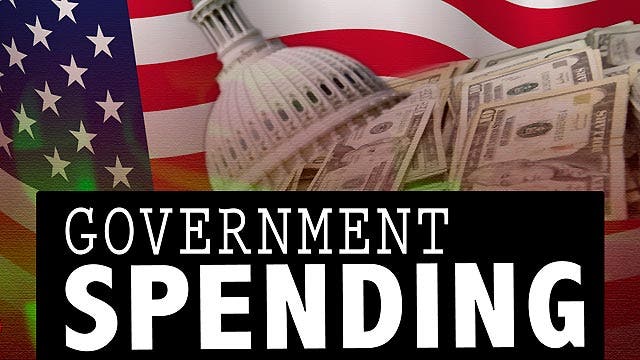Presidents have been talking about the federal government’s spending appetite for decades.
“We can’t spend ourselves rich,” Ronald Reagan once said.
Even President Obama said that “every day, families sacrifice to live within their means – they deserve a government that does the same.”
In the most recent talks to avoid the looming fiscal crisis, though, House Speaker John Boehner insists the president has been singing a different tune, and is “just not serious about cutting spending.”
But how much spending are we actually talking about? It may be difficult to wrap one’s head around how much the federal government doles out every day, but here is a snapshot.
Each day during the month of November, the government brought in a little more than $5 billion of revenue. That’s a lot of money – but the U.S. government spent in that time more than $11 billion a day. The difference is roughly $6 billion.
Of that $11 billion, the top items were as follows: The Department of Health and Human Services, which goes through roughly $3 billion a day; Social Security, which shells out roughly $2.5 billion a day; the Department of Defense, which runs a $1.8 billion daily tab; and interest on the debt, which eats up $854 million every day.
Economists say the latter number is the most concerning of all – since the country gets practically nothing in exchange for that. It’s just paying the bills on the debt, and the number is subject to wild fluctuation.
“We've got a $16 trillion debt, and servicing the debt is hard now,” former Democratic Sen. Evan Bayh of Indiana said. “This is with interest rates at record lows. God forbid something should happen to cause interest rates to go up even a little, back to where they ordinarily would be, the burden of this debt would become immensely greater.”
Alice Rivlin, Bill Clinton’s budget director, attributed the bulk of the spending problem to the promises made under Medicare, Medicaid and, to a lesser extent, Social Security.
"They'll drive federal spending up faster than our economy can grow,” she said. “And revenues won’t keep up, so we have a problem. If you don't have enough revenues to pay for the spending, you have to borrow. And on the track that we are on, if we go on doing what is in the law over the next several decades, our public debt will rise faster than our economy can grow.
“When that happens you got a real problem, because you’ve got to pay interest on that debt, and your creditors see that your debt’s rising faster than your economy is growing, so they charge more and more and it's a very bad situation,” she said.
Arthur Brooks, with the American Enterprise Institute, finds current debates about higher taxes misguided, with federal spending on overdrive.
“It's as simple as a family that does that. And the problem is right now you have a situation in which the government in its overspending ways tries to rationalize it by saying that actually the problem is we're under-taxing the American public,” he said. “It's like your irresponsible brother-in-law runs up his credit cards and goes bust and says the real problem is because you've stopped sending me checks.
“The truth of the matter is our country spends too much,” he said.













































